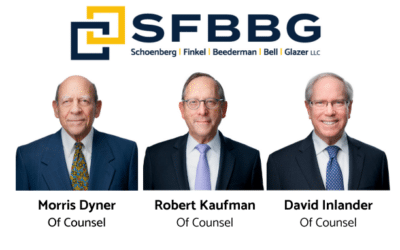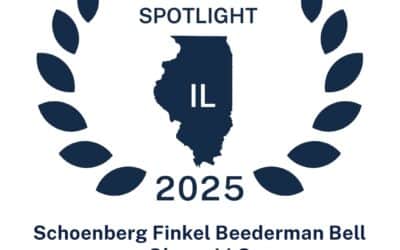On November 21, 2024, the Illinois Supreme Court issued its decision in the case Glorioso v. Sun-Times Media Holdings, LLC, (2024 IL 130137). SFBBG and its attorney Phil Zisook represent the Plaintiff in the case, Mauro Glorioso, the former Executive Director and General Counsel of the Illinois Property Tax Appeals Board (“PTAB”). The case involves articles published in the Chicago Sun-Times which defamed Mr. Glorioso.
The articles published that Glorioso had been charged in an anonymous Complaint filed with the Illinois Office of the Executive Inspector General (“OEIG”) with pressuring PTAB staff to provide a more than $1 million reduction in Trump Tower’s real estate taxes based upon political allegiance, not the merits of the case. They further charged that based upon his claimed political allegiance, Glorioso rejected the hearing officer’s decision that no reduction was warranted. The anonymous OEIG Complaint did not make these accusations and Sun-Times’ reporting was false. However, in a second set of articles, the Defendants attributed truth to their false characterizations. They reported that Glorioso, who they characterized as a “staunch republican,” in fact, pushed for Trump to get[a] $1 million refund on Trump Tower’s taxes. They also reported that Glorioso was under investigation “for his Trump Tower recommendation” and that he pressured staff to provide the refund. Defendants reported that the Chicago Schools would lose more than $540,00 “if Trump got what Glorioso wants.” SFBBG filed a Complaint on Glorioso’s behalf for defamation per quod, defamation per se, and false light invasion of privacy.
In the trial court, Defendants filed motions to dismiss challenging the sufficiency of the Complaint and its substantive allegations which were denied. The trial court found that the Defendants’ articles did not constitute fair reports of the OEIG Complaint and were based on a series of misstatements and material omissions. The court also rejected Defendants’ claim that the articles were reasonably capable of an innocent construction that Glorioso was merely under investigation.
Defendants then filed a motion to dismiss pursuant to the Illinois Citizen Participation Act (“ICPA”), claiming that Glorioso’s lawsuit was a strategic lawsuit against public participation (“SLAPP”). If a court finds that the lawsuit constitutes a SLAPP, the Complaint is dismissed with prejudice and the movant is awarded its attorneys fees. To prevail, the movant has to prove that its speech or conduct was in furtherance of participation of government, and genuinely aimed at procuring favorable government action, result, or outcome and that the plaintiff’s lawsuit is meritless.
While the Defendants’ SLAPP motion was pending, OEIG investigated the allegations of the anonymous Complaint and found they were categorically unfounded. Defendants’ SLAPP motion was denied in the trial court and that judgment was affirmed by the Illinois Appellate Court. Defendants then filed a Petition for Leave to Appeal in the Illinois Supreme Court, and the Court agreed to hear the case.
In the Illinois Supreme Court, Defendants argued that their articles were matters of public concern and should be protected by the ICPA. SFBBG and Zisook countered that Defendants’ articles did not seek government relief as required by the ICPA; they falsely reported news. Further, matters of public concern that did not seek relief from government were outside the scope of the ICPA. Although Defendants pointed to cases in other jurisdictions whose SLAPP acts had been found to protect speech on matters of public concern, those states had enacted specific legislation extending coverage to those matters. Other jurisdictions, whose anti-SLAPP acts were expressly based on citizen participation in government like the ICPA, had denied protection to speech on matters of public concern.
The Court clarified that the ICPA’s plain language protected only acts in furtherance of “participation of government” and did not extend to speech regarding matters of public concern that did not seek favorable government relief. Further, the Act’s stated policy is to “protect the constitutional rights of citizens and organizations to be involved and participate freely in the process of government.” It does not expressly address news media or freedom of the press, which are otherwise protected in Illinois jurisprudence.
The Court held that the first prong of the applicable test of whether the defendant’s speech or acts are “in furtherance of government participation,” requires courts to consider whether an objective person would find the acts were reasonably calculated to elicit a favorable government action or outcome.” The Defendants did not and could not pass the test. They purported to simply report news as a matter of public concern. Accordingly, the Court affirmed the judgment of the appellate court and remanded the case to the trial court for further proceedings.
For more information, contact Norm Finkel ([email protected]) or Phil Zisook ([email protected]) by calling (312) 648-2300.



